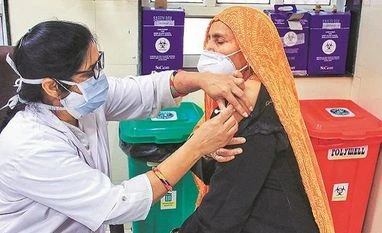Denying that there was any vaccine shortage, the Union health ministry on Tuesday said there were 16.7 million doses of vaccines available with Indian states. It was a problem of planning and not availability of vaccines, the Centre said, putting the blame on states.
Rajesh Bhushan, Union health secretary, said that there were over 20 million doses in the pipeline to be distributed to states. He said that a “bird’s eye view” showed that there was no dearth of vaccines in the country. States have already received more than 131 million doses of vaccines (131,090,370 doses), and have utilised (including wastage) around 114.3 million doses (114,369,677 doses) so far.
“From now till April end, 20,122,960 doses are in the supply pipeline to states and UTs,” Bhushan said.
“This clearly shows that the problem is a lack of better planning, not of vaccine doses shortage. We have made available vaccine doses to states and UTs from time to time and as we told you earlier, to bigger states we give four days of supply at once and on the fourth and fifth day, we replenish it. For smaller states, at once we supply 7-8 days of vaccine doses and on the seventh or eighth day, their supply is replenished,” he added.
“Some states like Kerala have zero wastage, while some others have close to 7-8 percent wastage, the health ministry noted. Bhushan felt that each state government has to monitor the unutilised doses at each cold chain point and then re-appropriate those doses if needed from one cold chain point to another.
“In any state, the case might be that in one district more consumption is taking place, while in another there is less. Our request to state governments is to ascertain where the doses can be reappropriated from,” he added.
Districts may have different consumption patterns, the health ministry feels and vaccine doses can get wasted or pass the expiry date by lying in an under-utilised cold chain point.
Giving details of the coronavirus situation in the country, Bhushan said the previous highest surge has already been crossed and the trend is going upward, which is a cause for worry.
“The previous highest surge was 94,372 daily cases in September, which is now 161,736 every day,” he said. “There are 53 central teams that are camping in 53 districts of the country that are showing a surge in cases. These central teams are helping the district administration as well the state administration, particularly the health department and revenue officials.”
The daily deaths are also showing an increasing trend. But the previous surge was 1,104, while at present it is 879 deaths.
He said Maharashtra, Uttar Pradesh, Delhi, Haryana and Gujarat are among the states of concern.
A serious situation is emerging, said NITI Aayog member (Health) V K Paul. While the situation is worse in some states, this is a countrywide problem and there has to be a continued focus on the test, track, trace and treat strategy besides following Covid-appropriate behaviour and vaccination, he said.
“Everyone should wear a mask.”
Amid reports of shortage of remdesivir, he said the drug is to be given only to hospitalised, serious patients and those on oxygen support. There is no question of its use in home setting and it is not to be procured from chemist shops.
“As a shortage of remdesivir was reported in some areas, its export was banned. This medicine is now available in plenty. We appeal to physicians to do rational, judicious use of remdesivir in hospitalised patients,” he said.
Paul also stressed on embracing Ayush products for boosting immunity.
Cancel board exams: Kejriwal
As Delhi recorded 13,500 new Covid cases, the highest single-day spike so far, CM Arvind Kejriwal urged the Centre to cancel the CBSE board exams. In all, 600,000 students in the city will take the exams and 100,000 teachers will be on duty, he said during a video address. “Conducting board exams can lead to large-scale spread of coronavirus... alternative methods of assessment can be explored. Students can be promoted on the basis of either online exams or internal assessment,” he said.
Unlock 30+ premium stories daily hand-picked by our editors, across devices on browser and app.
Pick your 5 favourite companies, get a daily email with all news updates on them.
Full access to our intuitive epaper - clip, save, share articles from any device; newspaper archives from 2006.
Preferential invites to Business Standard events.
Curated newsletters on markets, personal finance, policy & politics, start-ups, technology, and more.
)